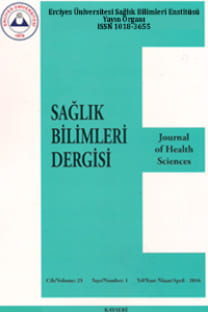FARKLI ÇÖZÜCÜLERLE HAZIRLANAN PROPOLİS ÖZÜTLERİNİN MUTANS STREPTOKOKLAR ÜZERİNE IN VITRO ANTİMİKROBİYAL ETKİSİ
Propolis arılar tarafından üretilen reçine içeren bir maddedir. Çok sayıda biyolojik aktiviteye sahip olan propolisin diş çürüğünün kontrolünde potansiyel uygulamalarıyla ilgili araştırmalar yapılmaktadır. Bu çalışmada, Türk propolisinin mutans streptokoklardan Streptococcus mutans üzerine antimikrobiyal etkisini değerlendirmek amaçlanmıştır.Propolis örnekleri etanol, metanol, kloroform, hekzan, etil asetat, ve propilen glikol ile fraksiyonlarına ayrılmıştır. Propilen glikolün buharlaşma ısısı yüksek olduğu için Propilen glikol dışındaki uzaklaştırılmış ve propolis özütleri elde edilmiştir. Etanol, metanol, kloroform, hekzan, etil asetat özütleri % 80 etanolde çözülerek, propolis + propilen glikol karışımı ise direkt kullanılmıştır. Bu özütlerin Streptococcus mutans üzerine in vitro antimikrobiyal konsantrasyon (MIC) ve minimum bakterisidal konsantrasyon belirlenmiştir. Sonuç olarak, Streptococcus mutans üzerine en iyi inhibitör etkiyi propolisin metanol ve etil setat özütleri göstermiştir
Anahtar Kelimeler:
Antimikrobiyal aktivite, çürük, propolis, streptococus mutans
The In vitro Effects of Propolis Extracts Prepared with Different Solvents on Mutans Streptococci
Propolis is a resinous substance made by bees. It possesses many biological activities, and many studies have reported its potential application in the control of dental caries. The aim of this study was to evaluate in vitro antimicrobial effects of Turkish propolis on Streptococcus mutans from mutans streptococci.Propolis samples was serially fractionated into ethanol, methanol, chloroform, hexane, ethyl acetate and propylen glicol. Then, solutions were removed by evaporation and propolis extracts were obtained except propylen glycol which has high evaporation temperature. Ethanol, methanol, choroform, hexane, ethly acetate extracts were used after 80% of ethanol dilution and propolis + propylen glycol was used directly. In vitro antimicrobial activity of these extracts on Streptococcus mutans was examined by determining minimum inhibitory consentration (MIC) and minimum bactericidal consentration (MBC) As a result, the methanol and ethyl acetate extracts showed the highest antimicrobial activity on Streptococcus mutans
Keywords:
Antimicrobial activity, caries, propolis, streptococus mutans,
___
- Bowen WH, Madison KM, Pearson SK. Influence of desalivation in rats on incidence of caries in intact cagemates. J Dent Res 1988, 67: 1316-1318.
- Koo H, Rosalen PL, Cury JA, et al. Effect of anew variety of Apis mellifera propolis on mutans streptococci. Curr Microbiol 2000, 41: 192-196.
- Alencar SM, Oldoni TLC, Castro ML, et al. Chemical composition and biological activity of a new type of Brazilian propolis: red propolis. J Ethnopharmacol 2007, 113: 278- 283.
- Duarte S, Rosalen PL, Hayacibara MF, et al. The influence of a novel propolis on mutans streptococcus biofilms and caries development in rats. Arch Oral Biol 2006, 51: 15-22.
- İkeno K, Ikeno T, Miyazawa C. Effects of propolis on dental caries in rats. Caries Res 1991, 25: 347-351.
- Koo H, Gomes BPFA, Rosalen PL, et al. In vitro antimicrobial activity of propolis and Arnica montana against oral pathogens. Arch Oral Biol 2000, 45: 141-148.
- Keskin N, Hazir S, Baser KH, Kürkçüoğlu M. Antibacterial activity and chemical composition of Turkish propolis. Z Naturforsch 2001, 56: 1112-1115.
- Kujumgiev A, Tsvetkova I, Serkedjieva Yu, et al. Antibacterial, antifungal and antiviral activity of propolis of different geopraphic origin. J Ethnopharmacol 1999, 64: 235-240.
- Koru O, Toksoy F, Acikel CH, et al. Chemical compositions and antimicrobial activities of four different anatolian propolis samples. Microbiol Res, 2005, 160: 189-195.
- Hegazi AG, Abd El Hady FK, Abd Allah FA. Chemical composition and antimicrobial activity of Europen propolis. Z Naturforsch 2000, 55: 70-75.
- Seidel V, Peyfoon E, Watson DG, Fearnley J. Comparative study of the antibacterial activity of propolis from different geographical and climatic zones. Phytother Res 2008, 22: 1256- 1263.
- Tosi B, Donini A, Romagnoli C, Bruni A. Antimicrobial activity of some commercial extracts of propolis prepared with different solvents. Phytother Res 1996, 10: 335-336.
- ISSN: 1018-3655
- Yayın Aralığı: Yılda 3 Sayı
- Başlangıç: 1993
- Yayıncı: Prof.Dr. Aykut ÖZDARENDELİ
Sayıdaki Diğer Makaleler
2010 YILI MEZUNLARI TEZ ÖZETLERİ (I)
ROMATOİD ARTRİT TEDAVİSİNDE GELENEKSEL VE GÜNCEL YAKLAŞIMLAR
FARELERDE PAPILLAE FILIFORMES’İN MORFOLOJİK ÖZELLİKLERİ ÜZERİNDE CİNSİYETİN ETKİSİ VAR MIDIR?
Mehmet KILINÇ, Serkan ERDOĞAN, Hakan SAĞSÖZ, M. Aydın KETANİ
KAYSERİ İLİNDE KÖPEKLERDE BRUCELLA CANİS İNFEKSİYONUNUN SEROLOJİK OLARAK ARAŞTIRILMASI
Birsen YILMAZ, K. Semih GÜMÜŞSOY
Soley ARSLAN, Duygu PERÇİN, Sibel SİLİCİ, A.nedret KOÇ, Özgür ER
Handan ZİNCİR, Ayla Bayik TEMEL
Burhan ELVERİR, Zafer GÖNÜLALAN
BILDIRCIN KARMA YEMLERİNE KATILAN YAĞ VE MAGNEZYUMUN PERFORMANS VE BAZI KAN PARAMETRELERİNE ETKİSİ
